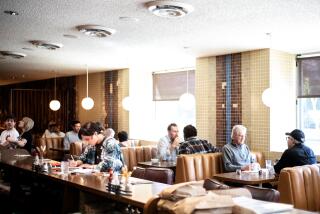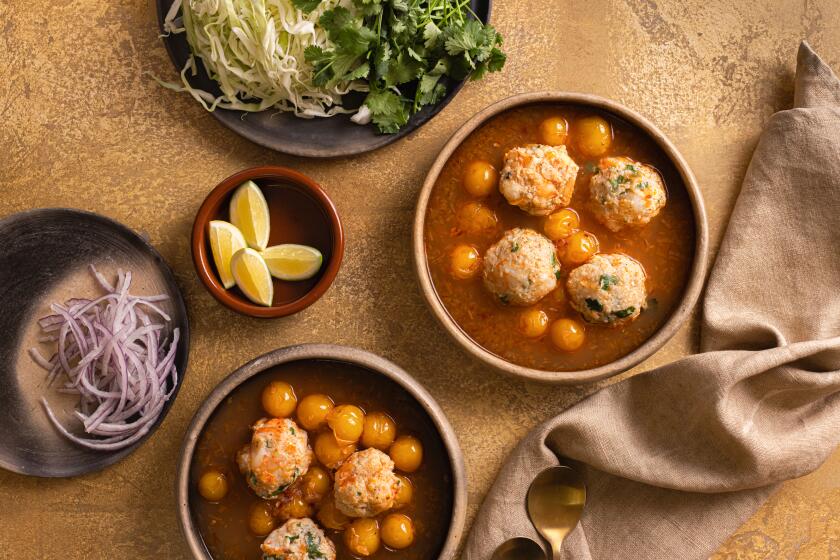Food trucks, an L.A. staple worth saving
It is nearly midnight, and the local businesses have long been shuttered for the night. This part of town goes to bed early. Yet late on a drizzly Tuesday, drawn by a truck serving Korean tacos, 200 people throng the sidewalk: Salvadoran kids and Mexican kids and a knot of young Koreans, tattooed art school students and clean-cut students from the local evangelical college, food-service people on their way home from work, a scattering of African Americans and at least a couple of guilty-looking dads who obsessively check in on the sleeping kids in the backs of their Volvos. It would be hard to find a crowd this mixed and this happy anywhere outside the bleachers at Dodger Stadium.
The short-rib tacos and kimchi quesadillas are tasty at Kogi — the truck’s maestro, Roy Choi, was the only Angeleno to be honored as a best new chef this year by Food & Wine magazine — but that doesn’t quite explain why fans obsessively monitor its Twitter feed, gossip about its secret menu items and stand in line for 45 minutes when they could fill up at a Jack in the Box drive-through window in one-tenth of the time.
The draw could be the communal experience, or it could be the feeling that you belong to a fraternity of the plugged-in. It could be that moment that defines street food of all types — your food is cooked, served and consumed in what seems like a single fluid motion; desire and fulfillment becoming one. Or it could be the impulse of citizenship: This sidewalk looks a lot like Los Angeles.
Restlessness has long been one of the characteristics of Los Angeles, and the city was famous for its drive-ins, its dine-and-dash coffee shops and its hash houses designed to resemble chili bowls long before the advent of kiwi vinaigrettes or barbecued chicken pizza. There are food trucks all across the country — Honolulu and Ithaca, N.Y., have well-known examples — but they somehow define the landscape best here, from the taco-slinging loncheros, to Kogi and to the legion of trucks that Kogi inspired, trucks serving Greek sausage or red-velvet pancakes or pastrami sandwiches or Vietnamese banh mi or Cantonese dim sum or South African bunny chow to restaurant-poor neighborhoods around town.
At downtown’s monthly Art Walk, the concentration of food trucks is perhaps a greater draw than the galleries. A recent festival brought 40 trucks and 5,000 people to the Rose Bowl. Food trucks have become a staple of reality TV. Food trucks, which attract so many like-minded people, may be indirectly responsible for more new relationships than OkCupid.
Food trucks in Los Angeles have become a tourist attraction. They are inclusive. They can bring fresh, healthy food to our “food deserts.” They represent creative, entry-level capitalism at its finest.
But all is not beer and skittles in food truck land, and there is no end of citizens wanting to break up the party, including owners of brick-and-mortar restaurants concerned that the low-overhead trucks are stealing their business. (It must be noted that licensed food trucks are already inspected and regulated.)
In 2008, county Supervisor Gloria Molina introduced legislation making it illegal for a food truck to park in one spot within unincorporated areas of the county, including East L.A., for more than an hour, which is barely enough time to set up a truck for service. A judge eventually threw out the ordinance, but truck operators often report being harassed for unavoidable parking infractions — being two inches into the red, for example — and L.A. City Council members Tom LaBonge and Paul Koretz have introduced a motion calling on city staff to study and make recommendations for how to restrict trucks in commercial areas.
The motion, which the city transportation committee will discuss again in mid-October, could put an end to the thriving and popular lunchtime food truck scene in the Miracle Mile district, as well as much of the rest of the city. Although to LaBonge’s credit, he is also proposing the kind of food truck parking zone that has worked pretty well in Portland, Ore. (If experience is a guide, expect the restrictions to be enacted but the parking zones to smother in a welter of departmental reviews.)
Do food trucks take business away from established restaurants? Undoubtedly, especially in areas where those restaurants tend to be both expensive and mediocre. Great cooking always wins out. But many of the best Los Angeles taquerias have also supported satellite food trucks, often with great success. Perhaps the affected restaurants should follow the lead of popular restaurants such as Border Grill and Canter’s Deli and branch out into food trucks of their own.
LaBonge and Koretz must not win. Let a thousand food trucks roll.
Jonathan Gold is the Pulitzer Prize-winning food writer for LA Weekly.
More to Read
Eat your way across L.A.
Get our weekly Tasting Notes newsletter for reviews, news and more.
You may occasionally receive promotional content from the Los Angeles Times.







